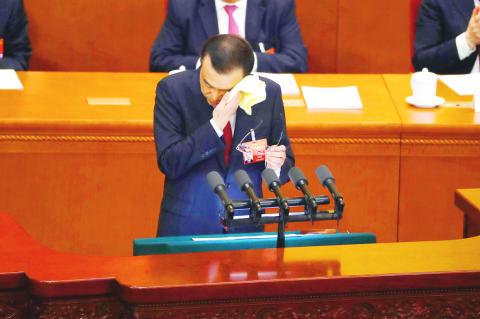China yesterday announced a 7.5 percent increase in military spending for this year, lower than last year as the nation faces an economic slowdown, but still likely to make Asian neighbors nervous.
It is working to provide the 2 million-strong Chinese People’s Liberation Army (PLA) with state-of-the-art hardware, spending heavily on stealth warplanes, aircraft carriers and other weaponry.
Beijing has also stepped up its rhetoric against any independence movements in Taiwan and continues to assert its vast territorial claims in the disputed South China Sea and East China Sea.

Photo: EPA-EFE
The government is to spend 1.19 trillion yuan (US$177.6 billion) on defense this year, after it increased its outlay by 8.1 percent to 1.11 trillion yuan last year, according to a government report presented at the start of the annual meeting of the National People’s Congress.
Boasting the world’s largest army, China’s military spending is second only to the US, which budgeted US$716 billion for defense this year.
China has not posted double-digit spending increases since 2015.
The Chinese government would make “further efforts to ensure the political loyalty of the armed forces,” Chinese Premier Li Keqiang (李克強) said in a speech to the nearly 3,000 members of the legislature, stressing the “absolute party leadership” over the military.
Li said the government would “strengthen military training under combat conditions and firmly protect China’s sovereignty, security and development interests.”
The lower spending increase comes as the nation’s economy is slowing, with the government setting a lower economic growth target of 6 to 6.5 percent.
“China’s military expenditure is coordinated with annual Chinese GDP growth,” said James Char, a military expert at Singapore’s Nanyang Technological University.
“China has other national priorities and an over-militarized national economy can deprive the government of much-needed resources, as what had happened to the former USSR,” Char said.
Chinese President Xi Jinping (習近平), who has vowed to turn the PLA into a “world class” military by mid-century, has repeatedly called on the army to be combat-ready.
“In Taiwan, you can legitimately worry about the Chinese budget increases, because they coincide with a more aggressive posture towards Taipei,” said Barthelemy Courmont, Asia researcher at the Institute for Strategic and Foreign Relations in Paris.
A photograph released on Twitter on Monday by ImageSat International showed that four Xian H-6 bombers from the People’s Liberation Army Air Force had been forward-deployed to the Xingning Air Base in Guangdong Province, only 450km from Taiwan.
Ministry of National Defense spokesman Major General Chen Chung-chi (陳中吉) yesterday reassured the public that the ministry has round-the-clock surveillance on military deployments or movements by China.
China also faces competing claims in the South China Sea from Taiwan, Vietnam, the Philippines, Brunei and Malaysia. It also has a territorial dispute with historic rival Japan in the East China Sea.
Additional reporting by staff writer

Taiwanese actress Barbie Hsu (徐熙媛) has died of pneumonia at the age of 48 while on a trip to Japan, where she contracted influenza during the Lunar New Year holiday, her sister confirmed today through an agent. "Our whole family came to Japan for a trip, and my dearest and most kindhearted sister Barbie Hsu died of influenza-induced pneumonia and unfortunately left us," Hsu's sister and talk show hostess Dee Hsu (徐熙娣) said. "I was grateful to be her sister in this life and that we got to care for and spend time with each other. I will always be grateful to

UNITED: The premier said Trump’s tariff comments provided a great opportunity for the private and public sectors to come together to maintain the nation’s chip advantage The government is considering ways to assist the nation’s semiconductor industry or hosting collaborative projects with the private sector after US President Donald Trump threatened to impose a 100 percent tariff on chips exported to the US, Premier Cho Jung-tai (卓榮泰) said yesterday. Trump on Monday told Republican members of the US Congress about plans to impose sweeping tariffs on semiconductors, steel, aluminum, copper and pharmaceuticals “in the very near future.” “It’s time for the United States to return to the system that made us richer and more powerful than ever before,” Trump said at the Republican Issues Conference in Miami, Florida. “They

REMINDER: Of the 6.78 million doses of flu vaccine Taiwan purchased for this flu season, about 200,000 are still available, an official said, following Big S’ death As news broke of the death of Taiwanese actress and singer Barbie Hsu (徐熙媛), also known as Big S (大S), from severe flu complications, the Centers for Disease Control (CDC) and doctors yesterday urged people at high risk to get vaccinated and be alert to signs of severe illness. Hsu’s family yesterday confirmed that the actress died on a family holiday in Japan due to pneumonia during the Lunar New Year holiday. CDC Deputy Director-General Tseng Shu-hui (曾淑慧) told an impromptu news conference that hospital visits for flu-like illnesses from Jan. 19 to Jan. 25 reached 162,352 — the highest

TAIWAN DEFENSE: The initiative would involve integrating various systems in a fast-paced manner through the use of common software to obstruct a Chinese invasion The first tranche of the US Navy’s “Replicator” initiative aimed at obstructing a Chinese invasion of Taiwan would be ready by August, a US Naval Institute (USNI) News report on Tuesday said. The initiative is part of a larger defense strategy for Taiwan, and would involve launching thousands of uncrewed submarines, surface vessels and aerial vehicles around Taiwan to buy the nation and its partners time to assemble a response. The plan was first made public by the Washington Post in June last year, when it cited comments by US Indo-Pacific Commander Admiral Samuel Paparo on the sidelines of the Shangri-La Dialogue